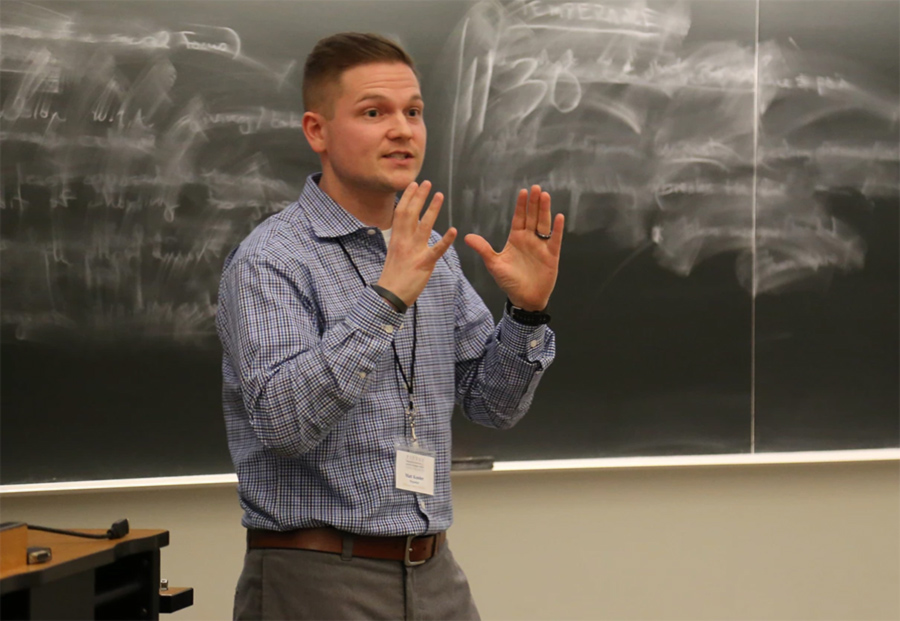As the global COVID-19 pandemic continues to affect numerous aspects of daily life everywhere, the act of traveling, too, has continued to be limited. For university students who had planned on studying abroad and families who had planned trips internationally, the prospect of cancelling flights, hotels, and all other plans has become a near certainty, at least for the time being. Relatedly, while the number of people traveling in order to learn a foreign language has continued to increase exponentially over the past several years, many have been dismayed by the lost opportunities for cross-cultural engagement with others from distant countries.

It is in this light that Dr. Matt Kessler, Assistant Professor of Applied Linguistics at the University of South Florida, working in collaboration with his colleagues from Michigan State University, Dr. Shawn Loewen and Mr. Daniel Trego, set out to explore the potential of technology to help bridge this gap.
“There are many tools and companies out there” Kessler says, “that offer language learners options for connecting with native speakers around the globe. So we were interested in seeing what kind of potential these platforms hold for language learning.”
In particular, Kessler and his colleagues investigated an existing commercial tool called TalkAbroad. TalkAbroad is a company that offers users real-time conversation exchanges with speakers of different languages, including: Arabic, English, French, German, Italian, Spanish, Japanese, and more. TalkAbroad’s conversation partners are trained by the company to engage with learners, and for a small fee (usually $10 or less), learners can talk with native speakers in live video conversations lasting 15 or 30 minutes, discussing various topics. Learners can also schedule their own conversations, and they can choose a conversation partner based on the specific language they are learning, in addition to their conversation partner’s specific country of residence, gender, hobbies, and more.
Kessler and his colleagues examined TalkAbroad’s potential for facilitating certain aspects of language learning that are known to be vital. Kessler says, “what we know about language learning, especially when it comes to learning an additional language, is that people actively need to be aware and to notice different features of the language they’re learning in order to acquire it.” Therefore, in their study, the researchers followed 35 university students who were learning Spanish as a foreign language.
Using TalkAbroad, all 35 participants engaged in one-on-one 30-minute video conversations with Spanish speakers who were residing in different Spanish-speaking countries. Immediately following the students’ conversations, the participants completed an online questionnaire, in which they were asked questions about things they had noticed during their sessions, such as new vocabulary, grammar, and cultural content/information. One-week later, students then revisited their conversations, which were audio-recorded. Students reviewed their conversations, and afterwards, they completed a second, identical questionnaire inquiring about new vocabulary, grammar, and cultural content/information they had noticed.
Kessler noted that the purpose of this design was to see: What kinds of things are language learners consciously noticing as they engage in the live video conversations? And conversely: When removed from those conversations with the ability to reflect on them as an observer, what kind of benefit does this offer as well? Are there things that students were unable to notice during the live conversation?

In their results, the researchers found that the live conversations with TalkAbroad were beneficial for students when it came to learning new vocabulary along with cultural content about their interlocutors’ home countries, such as learning about food culture, music, clothing, and more. However, the learners unanimously reported not noticing any new grammar during their video conversations. Conversely, when reflecting on their conversations, students reported noticing new vocabulary, cultural information, and some grammar that they had missed during their live conversations.
According to Kessler, the fact that students did not notice grammar during their live conversations is not surprising. “What we know about language learning is that when communicating, learners often cannot attend to meaning and form (i.e., grammar) at the same time. What this means is that if I am conversing with you and trying to understand what you’re saying, I’m most likely focused on your meaning, and I cannot simultaneously focus on the specifics of how you’re conveying that meaning—that being the grammar.”
In sum, the researchers reported that platforms like TalkAbroad can be beneficial for language learners, especially when it comes to learning new vocabulary and information about others’ cultures. For instance, some of the participants in the study reported that their Spanish-speaking conversation partners even virtually showed the learners around their kitchens and the different kinds of food they had in their homes in order to better help the students learn new vocabulary.
“Based on our initial research, platforms like TalkAbroad are pretty useful, especially in times like these. They not only improve opportunities for language learning by expanding the walls of the classroom, but they also enable some virtual travel as well,” concludes Kessler.
Kessler expects the next step is to continue examining these different technologies not only from the perspective of a researcher, but also from that of the language learners themselves. He expects to continue the research with his team by expanding the group of students they question in the future. Individually, he also plans to investigate other language learning apps outside of TalkAbroad.
